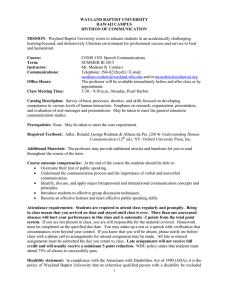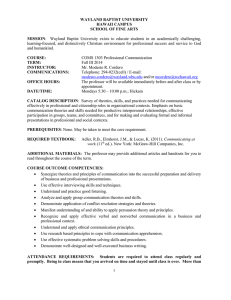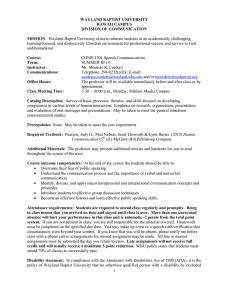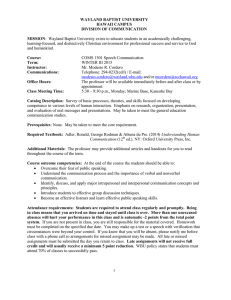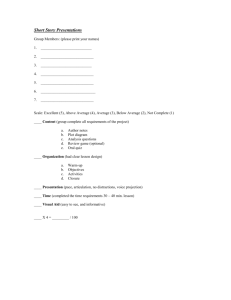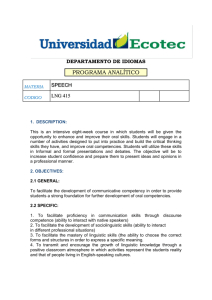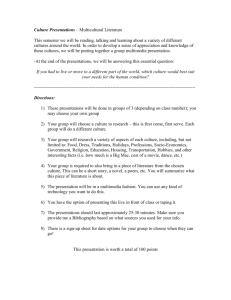WAYLAND BAPTIST UNIVERSITY HAWAII CAMPUS SCHOOL OF FINE ARTS MISSION
advertisement
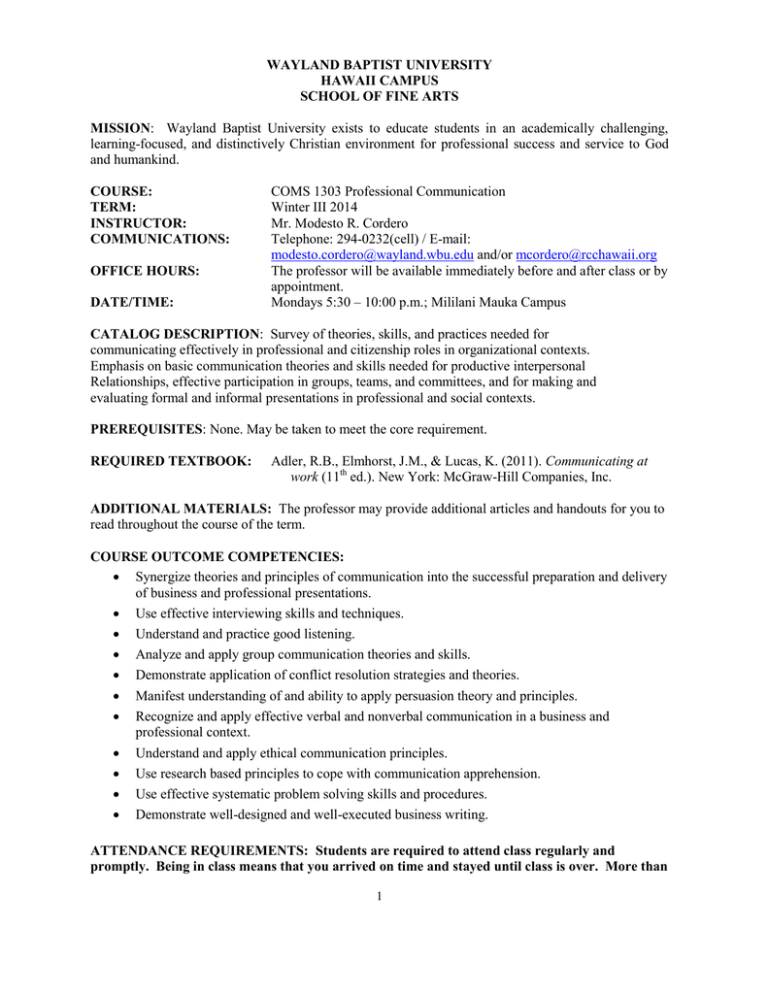
WAYLAND BAPTIST UNIVERSITY HAWAII CAMPUS SCHOOL OF FINE ARTS MISSION: Wayland Baptist University exists to educate students in an academically challenging, learning-focused, and distinctively Christian environment for professional success and service to God and humankind. COURSE: TERM: INSTRUCTOR: COMMUNICATIONS: OFFICE HOURS: DATE/TIME: COMS 1303 Professional Communication Winter III 2014 Mr. Modesto R. Cordero Telephone: 294-0232(cell) / E-mail: modesto.cordero@wayland.wbu.edu and/or mcordero@rcchawaii.org The professor will be available immediately before and after class or by appointment. Mondays 5:30 – 10:00 p.m.; Mililani Mauka Campus CATALOG DESCRIPTION: Survey of theories, skills, and practices needed for communicating effectively in professional and citizenship roles in organizational contexts. Emphasis on basic communication theories and skills needed for productive interpersonal Relationships, effective participation in groups, teams, and committees, and for making and evaluating formal and informal presentations in professional and social contexts. PREREQUISITES: None. May be taken to meet the core requirement. REQUIRED TEXTBOOK: Adler, R.B., Elmhorst, J.M., & Lucas, K. (2011). Communicating at work (11th ed.). New York: McGraw-Hill Companies, Inc. ADDITIONAL MATERIALS: The professor may provide additional articles and handouts for you to read throughout the course of the term. COURSE OUTCOME COMPETENCIES: Synergize theories and principles of communication into the successful preparation and delivery of business and professional presentations. Use effective interviewing skills and techniques. Understand and practice good listening. Analyze and apply group communication theories and skills. Demonstrate application of conflict resolution strategies and theories. Manifest understanding of and ability to apply persuasion theory and principles. Recognize and apply effective verbal and nonverbal communication in a business and professional context. Understand and apply ethical communication principles. Use research based principles to cope with communication apprehension. Use effective systematic problem solving skills and procedures. Demonstrate well-designed and well-executed business writing. ATTENDANCE REQUIREMENTS: Students are required to attend class regularly and promptly. Being in class means that you arrived on time and stayed until class is over. More than 1 one unexcused absence will hurt your performance in this class and is automatic -2 points from the total point system. If you are not present in class, you are still responsible for the material covered. Homework must be completed on the specified due date. You may make up a test or a speech with verification that circumstances were beyond your control. If you know that you will be absent, please notify me before class with a phone call so arrangements for missed assignment may be made. All late or missed assignments must be submitted the day you return to class. Late assignments will not receive full credit and will usually receive a minimum 5 point reduction. WBU policy states that students must attend 70% of classes to successfully pass. DISABILITY STATEMENT: In compliance with the Americans with Disabilities Act of 1990 (ADA), it is the policy of Wayland Baptist University that no otherwise qualified person with a disability be excluded from participation in, be denied the benefits of, or be subject to discrimination under any education program or activity in the university. The Coordinator of Counseling Services serves as the coordinator of students with a disability and should be contacted concerning accommodation requests at (806) 291-3765. Documentation of a disability must accompany any request for accommodations. COURSE FORMAT/REQUIREMENTS: This course is a combination of an interactive, cooperative experience between the students and the instructor. The format is designed to integrate lectures, small group work, discussions, and student presentations. Student active participation is encouraged. Chapter readings of the textbook and homework will be assigned in advance. It is important that all students read the assigned chapters prior to class and come well prepared to participate in the discussion of the material. For all written homework, proper grammar and correct spelling are essential. All written assignment and speech outlines must be typed double-spaced. Only hard copy will be accepted. Homework and outlines are not accepted via e-mail or fax. University students are expected to conduct themselves according to the highest standards of academic honesty. Academic misconduct for which a student is subject to penalty includes all forms of cheating, such as illicit possession of examinations or examination materials, forgery, or plagiarism. Plagiarism is the presentation of the work of another as one’s own work. It is the student’s responsibility to be familiar with penalties associated with plagiarism stated in the catalog. GRADING: The grading will be based on: Exams Class Attendance Class Participation Speeches Group Presentation 25% 10% 10% 40% 15% _______________________________________________ Total Possible: 100% A= 100-90, B= 89-80, C= 79-70, D= 69-60, F= 59-Below 2 ** A grade of incomplete is changed if the work required is completed prior to the last day of the next long (10-15 weeks) term, unless the instructor designates an earlier date for completion. If the work is not completed by the appropriate date, the I is converted to a grade of F. An incomplete notation cannot remain on the student’s permanent record and must be replaced by the qualitative grade (A-F) by the date specified in the official University calendar of the next regular term. An incomplete turned to a qualitative grade will be indicated by the notation I/grade on the student transcript. COURSE/READING SCHEDULE: Subject to change! WEEK DATE ACTIVITY 1 1/13/14 Course Overview Introductions Communicating at Work 2 1/20/14 Hometown Presentation Developing and Organizing the Presentation Types of Business Presentations (Informative Presentations) 3 1/27/14 Job/Career Presentation Verbal and Visual Support in Presentations Delivering the Presentation 4 2/3/14 Informative Speech Presentation* Types of Business Presentations (Persuasive Presentations) 5 2/10/14 Mid Term (1 Hour) Listening Verbal and Nonverbal Messages 6 2/17/14 Persuasive Speech Presentation** Interpersonal Strategies and Skills 7 2/24/14 Principles of Interviewing Communication, Culture, and Work 8 3/3/14 Leading and Working in Teams Effective Meetings 9 3/10/14 Group Presentations*** Types of Business Presentations (Special Occasion-Speaking) 10 317/14 Final Exam (1.5 Hour / Proctor) READING ASSIGNMENT Chapter 1 2 minutes Chapter 9 Chapter 12 3 minutes Chapter 10 Chapter 11 4-5 minutes Chapter 12 Chapters 1, 9-12 Chapter 3 Chapter 4 5-7 minutes Chapter 5 Chapter 6 Chapter 2 Chapter 7 Chapter 8 15-20 minutes Chapter 12 Chapters 2-8 *Informative Speech: Each student will deliver an informative speech of 4-5 minutes about a particular professional communication topic. The purpose is to inform the audience and not to persuade them. The presentation will consist of gathering at least 3 credible outside sources for your presentation, such as journal articles or credible books to be cited during your presentation. Your presentation should expand beyond what is covered in class. Each student will turn in an outline and a reference page of sources. Points will be deducted for not abiding to the time limit. **Persuasive Speech: Each student will deliver a persuasive speech of 5-7 minutes about a particular topic of importance in professional communication. The purpose is to persuade the audience to accept the speaker’s ideas about a particular issue, enterprise, product, or service. It is imperative for the speaker to demonstrate why his or her proposition is superior. The presentation will consist of gathering at least 4 credible outside sources for your presentation, such as journal articles or credible books to be cited during your presentation. Your presentation should expand beyond what is covered in class. Each student will turn in an outline and a reference page of sources. Points will be deducted for not abiding to the time limit. 3 *** Group Presentation: This presentation entails groups of 3-4 students working together. In your group, decide on a topic that is related to professional communication. Then each person will conduct library research and interview one person regarding one aspect of the topic. Your interview will be used as one source. Please integrate it into your main points. Each member of the group will then present one aspect of the project to the class in a 5-minute presentation and cite at least 3 credible sources. Points will be deducted if it is not between 4-5 minutes long. Hence, if you have 4 group members your group speech length should be about 20 minutes. Along with an introduction and conclusion to the entire presentation, each speaker should provide a mini-introduction and conclusion to his or her segment. Like the introduction, transitions are an especially important way to help listeners follow the structure of a group presentation. Work as a group to plan the introduction, conclusion, and transitions of your group presentation. The key is to synthesize the material together as a group presentation! Each student will receive a grade based upon their individual presentation. Each student will turn in an outline of their part of the speech and a reference page of their sources. In addition, each student will attach their interview questions and answers in a separate document. Note: 1. Point deductions will be given to students who do not fully participate with their group members throughout the entire process. Hence, it is imperative for students to show up to group meetings. 2. Presentations must be prepared and presented using Microsoft PowerPoint (please bring your presentation on a flashdrive or CD for easy compatibility with A/V equipment). Students are strongly advised to email themselves a copy of the presentation as backup. 3. Additionally, you are expected to be respectful of your peers in order to maintain a positive learning environment. Students who come to class regularly, do all the readings, but never speak unless forced to do so will earn a C in participation. Inconsistent performances and inconsiderateness may also cause a loss of points in this category. 4. Encyclopedias and dictionaries do not count as sources. 4
